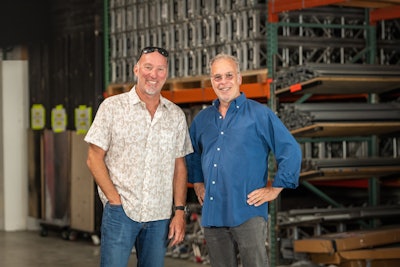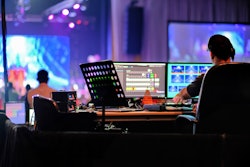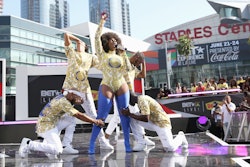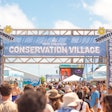
When event producer Joe Lewis and television producer R.A. Clark worked together on the Oscars red carpet a few years back, the two became fast friends. So much so that when they both put in an RFP for the upcoming MusiCares Person of the Year event, the longtime, Los Angeles-based producers had an interesting idea: What if they teamed up?
"We went to lunch, where I said, ‘Joe, I don't know your world in terms of putting on the event, from the time they leave the car till the time the cameras start rolling. But my forte is putting together shows like this. So why don't we join forces?’" remembers Clark.
Their resulting partnership, playfully called Lewis & Clark, ended up winning the bid to produce the event—an annual award show presented by MusiCares, the charity arm of the Recording Academy—which in January 2022 will honor Joni Mitchell at the Los Angeles Convention Center during the week of the Grammys.
"It was a perfect marriage as these tentpole television shows are beginning to become as much about the consumer-facing and fan-facing experience on-premise as it is on air," adds Lewis. "The person in the room was not historically as important to the broadcaster, the network and the client as it is today."
The two are no strangers to the world of high-profile entertainment events. Lewis is the founder of Joe Lewis Company, an experiential and entertainment company that has produced some of the most notable events around the world for clients like the Academy of Motion Picture Arts and Sciences, Disney, Red Bull, BET and the NFL. Clark, meanwhile, is the Emmy-nominated founder of Lion’s Heart Entertainment; in addition to being the executive producer of the Academy of Country Music Awards since 1999, he's also produced televised specials, red carpets and events surrounding everything from the Grammys and Academy Awards to the 2021 presidential inauguration.
The two plan to continue operating their independent companies, but team up as Lewis & Clark for events where their different specialties make sense, essentially providing a one-stop-shop for live events and broadcasts—which Clark describes as "the best of both worlds … live/experiential event experience with live music event broadcast expertise."
BizBash caught up with the pair to get their take on the future of televised award shows, lessons they've learned during the pandemic, why collaboration is key to recovery and more.
I'd love to hear how this partnership came about, and why now was the right time to do it.
CLARK: "Joe and I worked together a few years ago on the Oscar red carpet. I just liked his vibe and how he worked, and we always said to each other, ‘We’ve got to find more stuff to do together.’ ... Now, Joe Lewis Company still moves ahead and my little production arm, Lion's Heart, still moves ahead—but we come together on projects that make sense for us. That's what this relationship is about."
LEWIS: "With my strengths in the live event world and RAC’s strengths in the live broadcast world, it was a perfect marriage. ... [JLC has] been very fortunate to play in that gray area of broadcast and consumer-facing events for close to 20 years. I've built our business as an event production company, but I've been involved in a lot of live television events—specifically, the Oscars, where I have been one of the associate producers handling the broadcast and the business side of television for the last 13 years—whereas RAC handles the creative and business side of television. This match leans into his strengths in the TV world, my strengths in the TV world, and our collective strengths in the event world. So this was an opportunity for us to come together and go after a real, tangible project [like MusiCares' Person of the Year] instead of just putting our stake in the ground and going hey, we're open for business."
So really, it was the MusiCares pitch that brought you together. Is the goal to do future projects together?
LEWIS: "Yes. There's a lot of opportunity out there. So we're going to throw our name in the hat and we are going to go after some other tentpole projects that make sense for us."
CLARK: "We're also going to develop things. We're going to look at the landscape out there and look for opportunities that haven't really been exploited, and go to these organizations or go to these events and say, ‘Did you ever think about the amount of content that is being consumed through streaming opportunities?’ There's a play that's bigger than broadcast, more than there ever has been before. And I think that Joe and I have an opportunity to create some new things along with our potential partners that bring this all together. … I think there's a beautiful blend of consumer-facing live event production that ties into a stream or ties into a broadcast. That's what we're really going to go after."
LEWIS: "Brands are looking for ways to monetize what they have. And if we can provide a platform that allows for monetizable content—be it linear, nonlinear, on-premise, on-air—I think that's the sweet spot going forward."
Making a well-rounded experience for both in-person and TV watchers seems like a way your specialties can really come together.
LEWIS: "Correct. And then create something that can become a legacy project and a tradition. [With MusiCares,] we landed on a property that has a long history. We hope we can take that forward for as many years as they will have us, and expand on that. There's a lot of opportunity out there to begin to create new traditions."
Do you think as a result of the pandemic, attendees' and viewers’ expectations have changed for an event like MusiCares?
LEWIS: "People are ready to get back to in-real-life. ... My gut is they're going to be a little more accepting of what it is, and their expectations may not be what they were before the pandemic. That doesn’t give us a long leash to not do it right—but I do believe people are so hungry for in-real-life experiences that some of the things that may have been important before, and some of the risks that that networks and brands would not have taken before the pandemic, they may be willing to take now and be willing to accept now."
CLARK: "As long as we can keep everyone safe. That is the main thing that I think is foremost in everyone's mind. As long as the protocols are in place that keep artists, staff, crew and the general public safe—and I think we're at that point between vaccinations and testing. As Joe said, the hunger is there. The main thing is, especially as we ride the Delta variant and see what happens when the weather turns cold again, we're just going to have to adapt—and we're ready to do that. We've proven that we can do that, Joe and I individually and together."
Can you tease anything about the upcoming MusiCares event? How will your partnership enhance it in ways you couldn’t do on your own?
CLARK: "It's just starting to develop with the folks at MusiCares—[executive director] Laura Segura, who just took over MusiCares, and Joni [Mitchell’s] camp and the Recording Academy. We're just beginning to put our toe in the water, and dive into how we can shake it up a bit. There are certain traditions that have to happen. People arrive. There is a silent auction. There is a dinner. There is a show. But what can Joe and I do to just enhance that experience for the people attending?
Also, it's really never been seen at home, other than once as a cut-down version on Netflix. Part of our mission with MusiCares is to get it on a broadcast or a streamer as a full-length event. That's the key. It's all going to depend on who shows up for Joni—and right now, our cup runneth over."
LEWIS: "One thing we're going to focus on is, as much as this is about honoring the legacy of Joni Mitchell, we also want to honor the legacy of the mission of MusiCares. What is MusiCares? What is it about? What do they do? So that's going to be a focus for us. And hopefully the messaging for that starts well beyond the show day of Jan. 29. There are so many platforms available to us now on how to get the messaging out and begin to interface and interact with the consumer and the fans much sooner than when we get on-site. I believe there's a whole world and a whole audience out there is untapped."
Is there anything you’ve learned about live events and experiences over the last year-and-a-half that you’ll carry with you into the future?
CLARK: "On my side, it's that we can put shows together and deliver the same level of quality without having to show up in an office for eight weeks in a row. I like the interaction, the interpersonal interaction of an office, but sometimes that's not convenient, and sometimes things can be expedited and it can move a little bit quicker—at least on my side, in preproduction."
LEWIS: "Yeah. In our industry, we're all responsible enough to work from home. So I think the work from home and the remote work without all being packed into a production office is something that we proved could be done, and done well and be very productive.
I also think that we found creative ways to extend the brand beyond what you see in the room and on-air as a virtual extension. I think the virtual side of these events will not be a standalone any longer, because everybody is sick of virtual. But network shows and brands will find a way to monetize the virtual experience. That will complement everything we do in real life going forward, because they'll find a way to monetize that. They'll find a way to extend that brand beyond the audience in the room and on the other side of a screen.
I also believe that to some degree, the awareness around testing and protocol and compliance will always be with us. People will be much more conscious of their health and their safety and those around them. I know that'll be the case in California, and I hope that the rest of the country follows."
CLARK: "Especially in production—the white papers and everything that's come out through the DGA, IATSE and SAG-AFTRA on keeping staff and crew safe is a testament to embracing testing and vaccinations. I think that's going to extend into the consumer part of it, with live events—Live Nation, AEG, all the folks that are doing concerts around the country are looking at that model. I'm sure that the Recording Academy and MusiCares will be looking at that as we get closer to the event. California's at the forefront of this, and we're going to be able to show the rest of the country how to safely do a production and minimize risk to everybody from audience, to crew, to talent."
Is there anything else you wanted to mention, either about your partnership or your plans for the future?
LEWIS: "Everyone's had a lot of time to think the last 18 months about how we do these productions and who our resources are. [At JLC,] we were running so fast doing job after job, 200 or 300 projects a year, that we never slowed down and looked inward or looked outward to the other services and capabilities and people that were available. What we've learned over the last 18 months is there's a whole other world out there of skilled and capable people, services and companies that are there and standing on the sideline with their hands in the air saying, ‘Hey, we're available.’ ... Look at the whole emphasis on diversity, equity and inclusion—there is now a whole new roster of skilled people that we were never aware of because we never had time to slow down and think about who we were hiring and why we were hiring.
The other thing that's happened during all of this is that the bad guys and girls and bombastic people and obnoxious people in this industry who used to rule with a sharp tongue and a hot temper and produce or manage by intimidation—those people don't have a place in our business anymore. When I first started in the business over 25 years ago, and RAC probably a few years before me, those people were the norm. … Because of what's happened in the last 18 months, people are no longer settling on those people. Be it because of COVID, be it because of the social inequities, but the bad characters are getting outed."
Something I’ve observed is this amazing sense of collaboration, with people being more open to talking to their competitors. The two of you could have easily just seen each other as competitors, but instead you said, ‘Hey, let’s be stronger together.’
LEWIS: "Listen, I took more meetings with my competitors in the last 18 months than I have in the last 18 years. … You know what? As long as everyone in our business, in the live television and live event business, is doing a good job and doing honest work, it's good for all of us. The ones who aren't doing good work, and aren't doing honest work, this industry has no time for. There's no place for that, and I wish them no luck. [Laughs]"
CLARK: "Spoken as only Joe Lewis can!"
This interview has been edited and condensed.



















